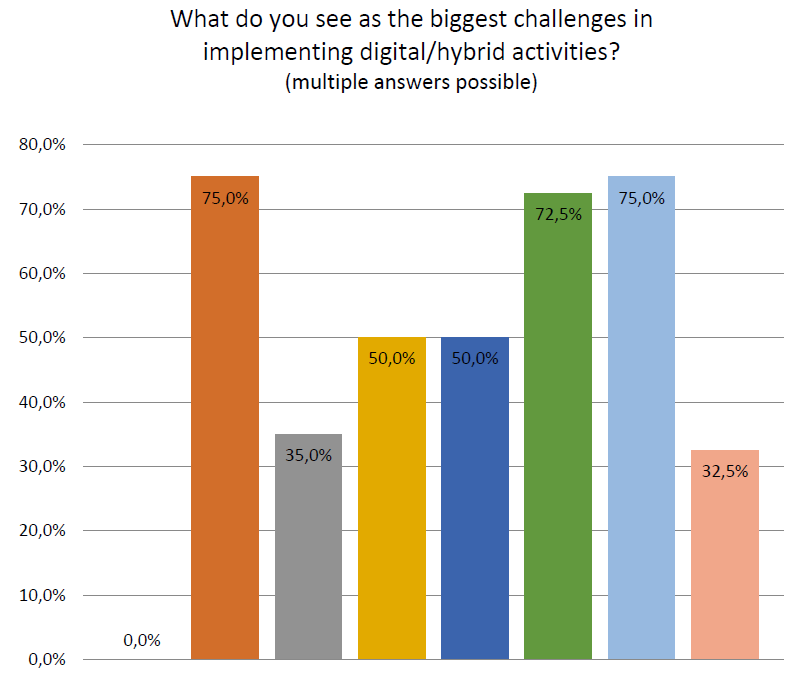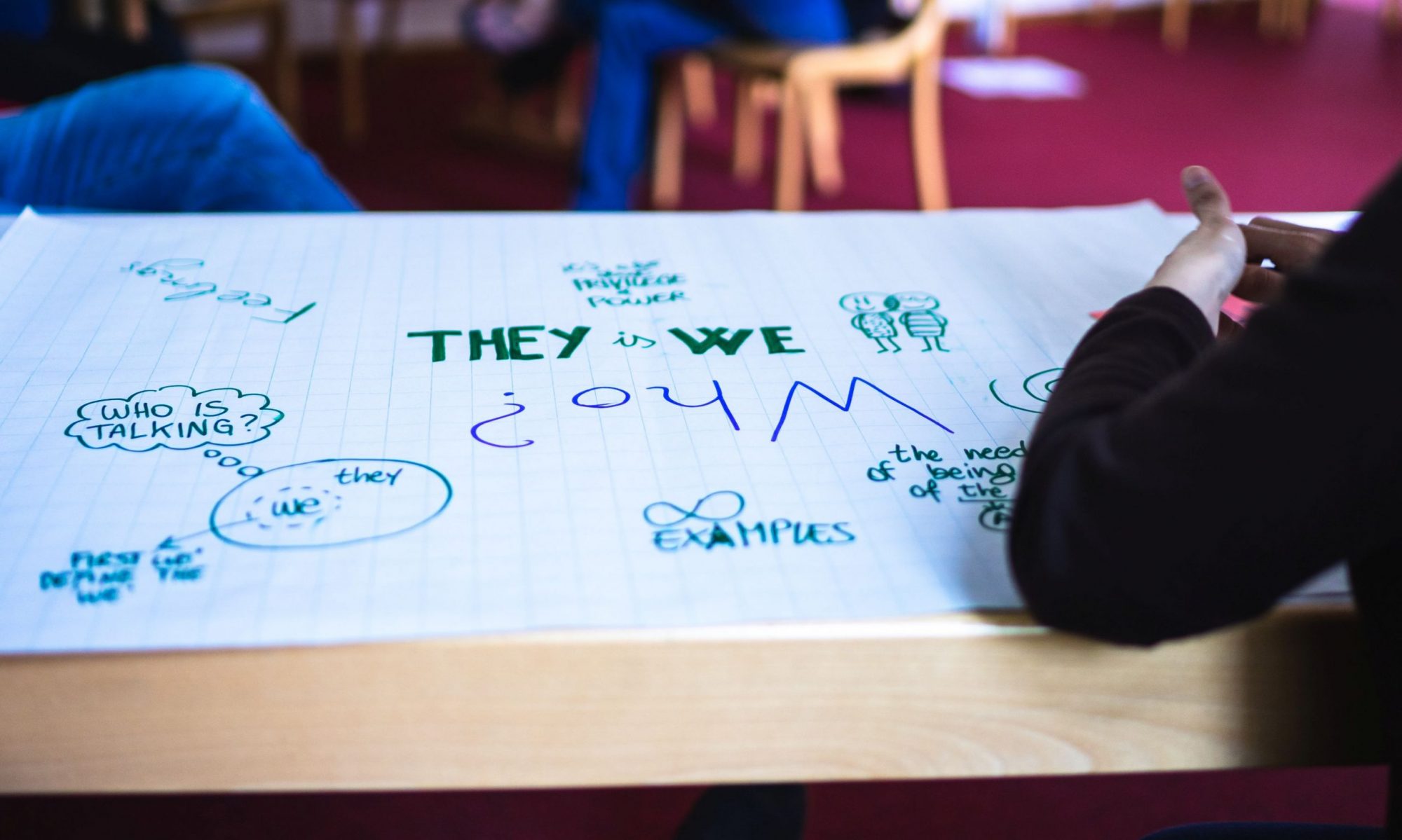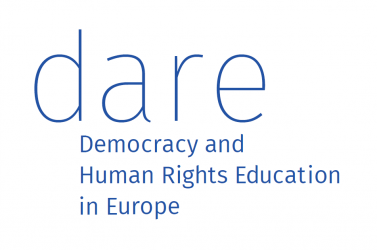DARE network is sharing the position published by five German organisations. Support digital and hybrid quality education! We are asking concretely for:
No digital cut!
Anchor adequate fundings in the new programme.
Erasmus+ is the most successful mobility program of the European Union. It has proven to make an essential contribution to the unity of the European Union, primarily through the Erasmus+ YOUTH IN ACTION program. It unfolds great potentials in promoting democracy, strengthening civil society and youth work (cf. RAY Interim Evaluation).
The Erasmus+ Youth in Action program has inspired innovation in youth work across Europe over the past 30 years. It is at risk, losing its role.
It loses this role with the current handling of Covid-19 regulations for substitutive digital activities and insufficient support for digital activities in the new Erasmus+ program, because it does not encourage the enhancement of European youth work in the digital space. That closes a window for innovation before it could even be opened properly. And it weakens European youth work as it becomes less flexible and misses the opportunity to move into modern post-pandemic blended-learning activities, combining digital and face-to-face meetings at a new level of quality.
In the current pandemic, European mobilities such as youth exchanges, seminars and training courses are hardly possible. Thus learning opportunities for the methodological and qualitative development of European youth work are significantly limited. In 2020, hopes were high that postponing the activities to the summer of 2021 would be sufficient. A year would be lost, but partnerships could be maintained. Many organisations responded quickly by creating digital alternatives. The National Agencies of the Erasmus+ Youth in Action program supported them until June 2020 with very flexible funding solutions.
Cut in June 2020 and expiring financial framework
In June 2020, however, the European Commission decided that the program would only fund digital alternatives at 35% of the funding rates for youth exchanges and 15% for training courses. This decision is diametrically opposed to the experience of organisations that are implementing digital programmes of high quality.
Practice shows, that after all, digital or hybrid usually means higher cost than face-to-face meetings.
Postponing mobilities further until 2022 is not only pointless because of the expiring financial framework. Two years in a row without any activities have numerous negative effects on European partnerships and local organisations. Such organisations often recruit participants and team members via peer-to-peer networks and are now in danger of losing two cohorts and the direct connection to their target group. Therefore, it is crucial for many organisations to implement meaningful digital activities now. Many youth organisations, especially in Southern Europe, depending on the funding provided by the Erasmus+ Youth in Action program.
If no reasonable and adequately funded replacement measures can be implemented this year, essential structures of European youth work are threatened to disappear.

The Impact
In this context, four organisations from different regions in Germany have joined forces with the AdB Arbeitskreis deutscher Bildungsstätten e.V. and surveyed the cost structure of digital alternatives. The 40 participating organisations from Germany would, in a non-pandemic year, jointly conduct 145 youth exchanges and training courses (Key Action 1), participate in 21 strategic partnerships (Key Action 2), and implement 22 measures to support policy reforms (Key Action 3) annually.

1: the financing
2: the lack of appropriate experts (moderators, language mediators, language animators, etc.)
3: the availability of adequate tools (lack of experience in the usage of digital tools)
4: to motivate the target groups to participate
5: to achieve similar quality as with face-to-face meetings
6: other challenges
The findings support the conclusion that the cuts in funding for digital activities are massively damaging European youth work and preventing innovation. This is exacerbated by the new Erasmus+ program, where digital and hybrid measures are still not sufficiently considered.
The survey indicates that engaging the intended target groups digitally or hybrid and creating European spirit and solidarity using innovative educational concepts is time-consuming, cost-intensive, and thus expensive.
Enthusiasm for the European idea is particularly awakened by meeting peers and sharing experiences, such as creating something together despite speaking poor English or making new friends abroad. These experiences motivate people to work towards a European community. Creating them in the virtual space requires flexible and creative methods, the involvement of interpreters, experienced workshop leaders in all countries, materials to be transferred from analogue into the digital sphere, and, within the constraint of the pandemic, face-to-face meetings in national groups. Simple and presumably affordable videoconferences will not establish such experiences and, therefore, will not inspire a European spirit. It doesn’t live up to the standards of non-formal education.
Action is required
To ensure that European youth work does not perish in 2021 and that essential innovation potential remain unused in the future, we urgently appeal to you:
Advocate for the European Commission Directorate-General for Education and Culture
Reverse the cut in the funding structure of digital replacement measures for activities already approved under the old financial framework;
Anchor the funding of pedagogically demanding digital and hybrid measures in the new Erasmus+ program on an equal footing with face-to-face meetings.

Arbeitskreis deutscher Bildungsstätten e.V.
Internationales Bildungs und Begegnungswerk e.V.
Children’s Association Leipzig e.V.
Kreisau Initiative e. V.
NaturKultur e.V.
Contact: Georg Pirker (Arbeitskreis deutscher Bildungsstätten) Email

